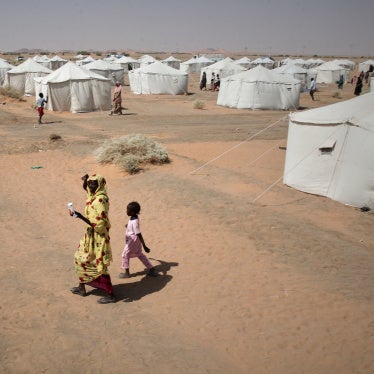The pace of proceedings is quickening at the International Criminal Court. On July 3, Jean-Pierre Bemba, the former vice president of Congo charged with war crimes, arrived in custody in The Hague. And today, July 14, the ICC prosecutor is expected to request new arrest warrants based on alleged crimes in Darfur against senior Sudanese officials, reportedly including the Sudanese president. Those are real accomplishments for a judicial institution whose underlying statute is now seeing only its 10th birthday.
Ten years ago in Rome on July 17, after five intense weeks of negotiations, lawyers from nearly 120 governments achieved a historic breakthrough. They helped extend the rule of law to those individuals responsible for the mass slaughter of civilians and for the use of rape as a weapon of war. They agreed on a treaty creating the International Criminal Court.
The ICC is the world's first permanent court mandated to bring to justice the perpetrators of war crimes, crimes against humanity, and genocide when national courts are unable or unwilling to do so. The court's statute entered into force on July 1, 2002, after its ratification by the required 60 states. In March 2003, 18 judges were sworn in. The prosecutor took office in June 2003 after his election by the statute's state parties. The ICC, once a distant aspiration, began to become a reality.
The U.S. government has had a stormy relationship with the court. The Clinton administration, though initially championing the ICC, voted against the treaty in Rome, but then still signed it in December 2000. The Bush administration attempted to withdraw the U.S. signature in 2002, and between 2002 and 2005, it launched an ideologically conceived diplomatic offensive against the court.
These efforts, by undercutting other important U.S. policy objectives, ultimately backfired. Moreover, in practice the court has failed to match the nightmarish characteristics its opponents ascribed to it. As a result, in the last few years, the current administration has taken a more pragmatic tack and is prepared to cooperate with the court in cases involving alleged crimes in Darfur and Uganda. Nevertheless, the U.S. relationship with the ICC will require serious upgrading by the incoming administration in January 2009.
Although the U.S. government policy toward the ICC has received some attention, much less is known about the court's limited practice. In the face of the daunting challenges confronting this new institution, it is important to assess the ICC's accomplishments, as well as its shortcomings, at this relatively early stage.
Notable Progress
The court has made notable progress in some significant ways. The prosecutor has opened investigations in the Democratic Republic of Congo, Uganda, the Darfur region of Sudan, and the Central African Republic.
These investigations-all of which have been conducted amid instability or ongoing conflict-have led to criminal charges against at least 12 alleged perpetrators from the four situation countries "bearing the greatest responsibility" for horrific acts. These are crimes for which there would have likely been complete impunity not long ago. At this writing, four of these alleged perpetrators are in ICC custody, and the others are stigmatized as accused war criminals evading justice.
The ICC's achievements are not limited to charges filed by the Office of the Prosecutor. To maintain ongoing contact with victims and witnesses, the Registry, which handles the nonjudicial aspects of the court's administration, has, in the face of formidable obstacles, established field offices in or near all four of the situation countries. From those field offices, court officials have begun to reach out to members of affected communities in refugee camps, internally displaced person camps, and remote villages to explain the ICC's mandate and its work. Witnesses have stepped forward to provide evidence. Some have done so because of the court's witness protection measures. The sensitivity of investigators and protection officers in the field-based on research that we did in eastern Congo, northern Uganda, and eastern Chad-has been impressive.
Defense attorneys have access to an independent office set up and funded by the court to provide them with essential legal support to help ensure their clients' right to a fair trial.
Victims also have a role. An innovative ICC feature, drawn from continental criminal procedure, allows the victims, through legal representatives, to make arguments in the proceedings. This participation could help bridge the gap between trials conducted in The Hague and the communities most affected by the crimes. Victims from Darfur, Uganda, and Congo have been accepted to participate in proceedings; on July 11, the ICC Appeals Chamber issued a decision on the scope and modalities of this participation.
Some Problems
Not surprisingly, in grappling with the enormous practical challenges of setting up a judicial institution like the ICC, officials have made mistakes.
Indeed, a decision on June 9 by the ICC's Trial Chamber I to stay the proceedings against Thomas Lubanga, a Congolese militia chief, delayed the start of the court's first trial. This was due to the prosecution's inability to disclose potentially exculpatory information to the defense. The prosecution had collected 200 documents under a provision of the court's statute that grants confidentiality to those supplying information as "springboard evidence." The potentially exculpatory material could not be turned over because some of the original information providers, including the United Nations, had not given the necessary consent. The Trial Chamber ruled that the Office of the Prosecutor's inability to disclose the material compromised Lubanga's right to a fair trial and stayed the proceedings pending a resolution. On July 3, the chamber ordered Lubanga's release, but the Appeals Chamber has suspended the order's effect pending its further consideration.
By insisting on Lubanga's fair trial rights, the judges clearly did the right thing, and the appropriate disclosure to the defendant will have to occur. Going forward, in building its cases for trial, the Office of the Prosecutor will have to use the provision that grants confidentiality sparingly. The office will also need to deploy sufficient investigative staff to follow up on the leads generated by information gathered under this provision.
The prosecutor Luis Moreno-Ocampo, to his credit, has wisely tried to avoid loading too many counts based on too many crime scenes into his arrest warrants. Heavily laden indictments contributed to very lengthy trials at the Yugoslav and Rwanda tribunals. In his arrest warrants for the Lord's Resistance Army leaders of Uganda and for the first two Sudanese officials accused of crimes in Darfur in April 2007, he has done well in citing a representative sampling of the most grave crimes. Unfortunately, in the case of Lubanga, he went too far and narrowed the charges to three counts of recruiting child soldiers, despite the many serious abuses with which Lubanga's forces are associated.
To the detriment of the appearance of the impartiality of his office, the prosecutor has conducted his investigations in eastern Congo in a sequential manner. There, he looked, in serial fashion, at claims against one ethnic militia after another. In polarized, highly charged situations where there are allegations of crimes by more than one ethnic group, this has raised questions about his looking at all parties to the conflict. This strict sequencing policy needs to be re-visited.
Although progress has been made in the court's efforts to answer questions and to explain its work to the communities affected in the four situation countries, the ICC needs to embark on a more robust, tailored, and targeted outreach and communication campaign to increase its impact in those communities looking for justice. It is essential for the court-including the prosecutor-to more proactively engage with these communities. This will require a full turn from the court's prior ambivalence to this field engagement. This ambivalence was evident in the ICC's early stunted approach to outreach and field presence. In order to realize their mandate, court officials need to deepen their commitment to a vision that fully embraces the importance of reaching the local communities.
Catching Suspects
These problems notwithstanding, the biggest challenge facing the ICC lies primarily outside of its control: apprehending suspects.
Without its own police force, the ICC must rely on the cooperation of the international community to enforce its orders. The ICC's mandate to investigate the worst crimes in ongoing conflicts tests to a much greater degree the cooperation that the Yugoslav and Rwanda tribunals previously received. Although there has been some active government and U.N. support, much more is needed.
In Uganda and Darfur, governments and the United Nations have tended to subordinate justice to other important international objectives such as peace negotiations or peacekeeping. While building support for arrests will be a long-term challenge, individual states, regional organizations, and the United Nations are going to have to manage the important interface between justice and peace in a new, more principled and consistent way. The ICC won't succeed without this.
In sum, there has been real progress at the ICC, but with a new judicial institution of this scope, there have been missteps. The court's work deserves support, careful monitoring, and constructive criticism. The victims of the horrific crimes that the ICC is mandated to investigate and bring to trial deserve nothing less.
Richard Dicker is the director of Human Rights Watch's International Justice Program in New York. Param-Preet Singh is counsel in the program.









